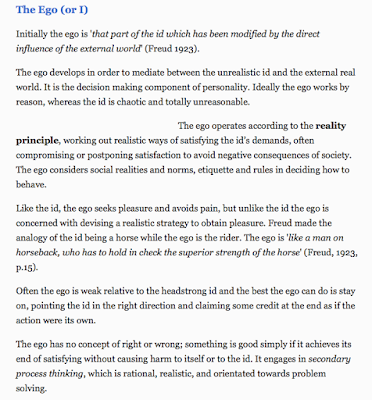The Ego- The ego operates alongside the reality principle, it works out realistic ways of satisfying the id’s demands, often by postponing pleasure to avoid negative consequences of society. Like the id the ego avoids pain and seeks pleasure, however unlike that of the id, the ego remains realistic in its search for pleasure. Freud made the analogy that the id is like the horse and the ego is the rider, "The ego is like a man on horseback, who has to hold in check the superior strength of the horse" (Freud, 1923, P15). The ego engages in secondary process thinking, which is realistic, rational and is orientated towards problem solving.
The Superego- This is the regulator of pleasure, it will censor the id, but will also license it. For example in the film 'Fight Club' the superego appears in a number of different forms, initially in the self help groups which allow him some sleep and then within the fight clubs which allow the acts of aggression. The superego may also be identified with the police who enter the narrative at moments of crisis. The superego is developed when one realises the social norms of society.
 The id- This part of the human personality is formed via the desires of an individual and can be seen in the film 'Fight Club' through the character of Tyler Durden who effectively does what he wants whether thats hurting people, sleeping with whoever he wants or stealing whatever he wants. Whenever he has a desire he acts upon it, even if this causes pain or inconvenience to others. The id demands instant satisfaction and when this happens we experience pleasure, when it is denied we experience displeasure or pain. Freud believed that the id operated on the 'pleasure principle' which is the idea that every wishful impulse should be satisifed immediately regardless of the consequences.
The id- This part of the human personality is formed via the desires of an individual and can be seen in the film 'Fight Club' through the character of Tyler Durden who effectively does what he wants whether thats hurting people, sleeping with whoever he wants or stealing whatever he wants. Whenever he has a desire he acts upon it, even if this causes pain or inconvenience to others. The id demands instant satisfaction and when this happens we experience pleasure, when it is denied we experience displeasure or pain. Freud believed that the id operated on the 'pleasure principle' which is the idea that every wishful impulse should be satisifed immediately regardless of the consequences.References - http://www.simplypsychology.org/psyche.html
The Pocket Essential 'Film Studies' - Andrew M.Butler


No comments:
Post a Comment